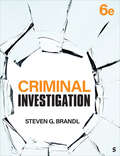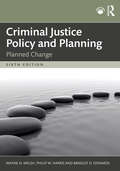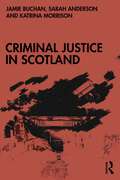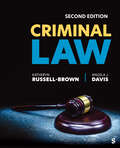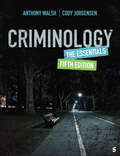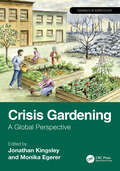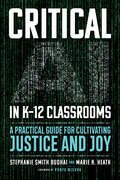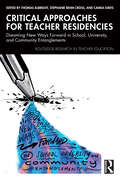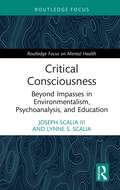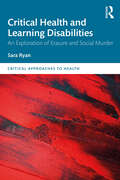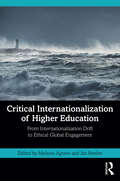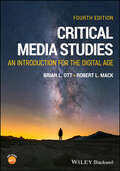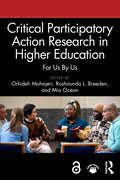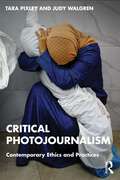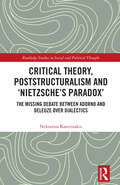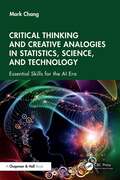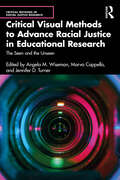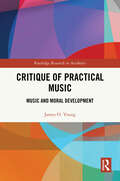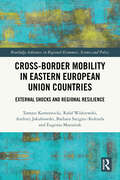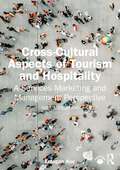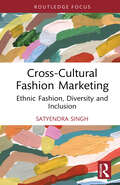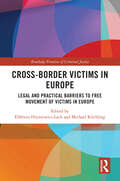- Table View
- List View
Criminal Investigation
by Steven G. BrandlCriminal Investigation, Sixth Edition offers a comprehensive and engaging examination of criminal investigation and the vital role criminal evidence plays in the process. Written in a straightforward manner, the text focuses on the five critical areas essential to understanding criminal investigations: background and contextual issues, criminal evidence, legal procedures, evidence collection procedures, and forensic science. In this brand new edition, author Steven G. Brandl goes beyond a simple how-to on investigative procedures, and draws from fascinating modern research, comprehensive cases, and criminal evidence to demonstrate their importance in the real world of criminal justice, providing students with practical insights into the field of criminal investigation.
Criminal Investigation
by Steven G. BrandlCriminal Investigation, Sixth Edition offers a comprehensive and engaging examination of criminal investigation and the vital role criminal evidence plays in the process. Written in a straightforward manner, the text focuses on the five critical areas essential to understanding criminal investigations: background and contextual issues, criminal evidence, legal procedures, evidence collection procedures, and forensic science. In this brand new edition, author Steven G. Brandl goes beyond a simple how-to on investigative procedures, and draws from fascinating modern research, comprehensive cases, and criminal evidence to demonstrate their importance in the real world of criminal justice, providing students with practical insights into the field of criminal investigation.
Criminal Justice Policy and Planning: Planned Change
by Philip W. Harris Wayne N. Welsh Bradley D. EdwardsUnlike other textbooks on the subject, this book presents a comprehensive and structured account of the process of administering planned change in the criminal justice system. The authors detail a simple yet sophisticated seven-stage model, which offers students and practitioners a full account of program and policy development from beginning to end. Within these stages, students focus on performing essential procedures, such as conducting a systems analysis, specifying an impact model, identifying target populations, making cost projections, collecting monitoring data, and performing evaluations. In reviewing these steps and procedures, students can develop a full appreciation for the challenges inherent in the process and understand the tools they require to meet those challenges. To provide for a greater understanding of the material, the text uses a wide array of real-life case studies and examples of programs and policies. By examining the successes and failures of various innovations, the authors demonstrate both the ability of rational planning to make successful improvements and the tendency of unplanned change to result in undesirable outcomes. The result is a powerful argument for the use of logic, deliberation, and collaboration in criminal justice innovations.This readable volume is ideal as a primary or supplemental text in criminal justice policy-related courses, and also serves as a useful reference for practitioners in the field tasked with strategic planning for policy change.
Criminal Justice in Scotland
by Jamie Buchan Sarah Anderson Katrina MorrisonProviding a comprehensive and up-to-date introduction to the contemporary Scottish criminal justice system, this book focuses on its key processes (from arrest to post-sentence) and institutions, as well as its history and some of the key challenges and critical issues facing Scottish criminal justice today.Highly attentive to procedural and institutional detail, this book is underpinned by a critical sociological perspective. The opening chapter considers Scotland in its post-devolutionary context within the UK, setting the scene for Scottish criminal justice institutions. Subsequent chapters deal in turn with different institutions and processes of Scottish criminal justice: surveillance and crime prevention, policing, prosecution and the courts, criminal fines and other financial penalties, community justice, electronic monitoring, prisons, youth justice, and parole and post-sentence reintegration and supervision. The final chapter draws on comparative and international criminology to look at Scottish criminal justice in changing international contexts and its response to new global crimes.Designed to support learning, it includes the following: Key ideas at the start of each chapter, outlining expectations and providing a very high-level summary of the most important points Text boxes covering key issues, controversies and/or key populations in focus Critical questions to challenge students to develop their own thinking and ideas about key issues in Scottish criminal justice Short, informal interviews with key practitioners and researchers Essential readings and key resources at the end of each chapter Criminal Justice in Scotland is a key text for students of criminology and criminal justice, particularly those with an interest in the Scottish criminal justice system. It will also be of value to students of law, social work and social policy.
Criminal Law
by Angela J. Davis Katheryn K. RussellCriminal Law, Second Edition provides your students with an understanding of the U.S criminal justice system, using a sociological framework that illustrates how criminal law and the justice system impact the real world. Throughout the text, case excerpts and detailed summaries highlight key principles of criminal law, offering a thorough and engaging exploration of complex concepts.
Criminal Law
by Angela J. Davis Katheryn K. RussellCriminal Law, Second Edition provides your students with an understanding of the U.S criminal justice system, using a sociological framework that illustrates how criminal law and the justice system impact the real world. Throughout the text, case excerpts and detailed summaries highlight key principles of criminal law, offering a thorough and engaging exploration of complex concepts.
Criminology: The Essentials
by Anthony Walsh Cody JorgensenIn Criminology: The Essentials, authors Anthony Walsh and Cody Jorgensen introduce students to major theoretical perspectives and criminology topics in a concise, easy-to-read format. This straightforward overview of the major subject areas in criminology thoroughly covers the most up-to-date advances in theory and research, while challenging students to consider the applications of these theories as well as their policy implications. Updates to the Fifth Edition include new topics and developments in criminology, such as racial disparities in arrest rates, insights from the Big Five personality traits, cognitive behavioral therapy, gun violence and policy, and the opioid epidemic. It also offers detailed evaluations of theories to deepen student understanding and foster engaging classroom discussions.
Criminology: The Essentials
by Anthony Walsh Cody JorgensenIn Criminology: The Essentials, authors Anthony Walsh and Cody Jorgensen introduce students to major theoretical perspectives and criminology topics in a concise, easy-to-read format. This straightforward overview of the major subject areas in criminology thoroughly covers the most up-to-date advances in theory and research, while challenging students to consider the applications of these theories as well as their policy implications. Updates to the Fifth Edition include new topics and developments in criminology, such as racial disparities in arrest rates, insights from the Big Five personality traits, cognitive behavioral therapy, gun violence and policy, and the opioid epidemic. It also offers detailed evaluations of theories to deepen student understanding and foster engaging classroom discussions.
Crisis Gardening: A Global Perspective (Advances in Agroecology)
by Monika EgererGardening during times of crisis can have significant benefits to individuals and populations interms of health, well-being, social and economic outcomes. So-called ‘crisis gardening’ can even belinked to transformative change in food systems through socio-ecological aspects of agroecology.In this book, crisis gardening is explored to better define, describe and provide recommendationsabout this activity globally. Diverse perspectives are offered from scholars around the world, providingan overview of gardening during crises with ties to agroecology. Such a perspective is criticalas we grapple with food system crises, pandemics, climate change, biodiversity loss, mental healthissues and political conflict globally.• The first section defines and explains crisis gardening in relation to agroecology, transformative change in food systems and public health.• The second section describes case studies from around the world of crisis gardening from various social-ecological perspectives.• The third section provides policy and practice recommendations and how to scale up the lessons from crisis gardening to transform food systems, public health systems, and policy and landscape planning processes.Bringing together leaders and experts (academics, policy makers and practitioners) from around theworld, the book provides case studies of crisis gardening and develops recommendations to harnessthe lessons from this practice.
Critical AI in K-12 Classrooms: A Practical Guide for Cultivating Justice and Joy
by Stephanie Smith Budhai Marie K. HeathA practical guide for teachers and students navigating the complicated intersection of artificial intelligence, education, and justice Artificial intelligence is rapidly integrating into today&’s classrooms, but unlike other new technologies, AI has the potential to harm, making it difficult to take advantage of its benefits. In Critical AI in K–12 Classrooms, Stephanie Smith Budhai and Marie K. Heath draw attention to the biases embedded within AI algorithms, such as those powering OpenAI&’s ChatGPT and DALL-E, to guide students and teachers in developing strategies to best incorporate AI—or not—into equitable learning. AI&’s reliance on existing data and knowledge systems means Black, queer, those with disabilities, and other marginalized students are at greater risk of being harmed by built-in limitations and bias. Budhai and Heath show how to circumvent if not actively resist such harms as machine learning, NLPs, LLMS, and GenAI enter the classroom, with practical examples rooted in culturally sustaining, abolitionist, and fugitive pedagogies across disciplines. Their practical guide creatively answers the concerns of educators committed to forward-thinking yet fair instruction and the needs of students eager to use AI for just ends. Critical AI in K–12 Classrooms meets the challenges of a key STEM technology with an eye toward cultivating a more just world. Balancing responsible learning with the joy of discovery, Budhai and Heath build a framework for AI instruction that all educators can confidently use.
Critical Approaches for Teacher Residencies: Dreaming New Ways Forward in School, University, and Community Entanglements (Routledge Research in Teacher Education)
by Thomas Albright Stephanie Behm Cross Camea DavisThis book asks whose histories, knowledges, struggles, sorrows, joys, dreams, and expertise matter in teacher education and teacher residencies. It conceives of teacher residencies as a space for the multiplicity of voices and experiences needed to create opportunities for more democratic education and explores how this might be achieved despite the ways in which schools have become both more politicized and standardized in recent years. It argues that this work will not happen in silos but in community. As such, it showcases residency programs and program providers that have embraced a critical turn in residency work, as well as the voices and perspectives of critical community co-conspirators and the youth being served. Chapters examine geo-socio-historical and political contexts, the democratic and participatory nature of residency work, critical theoretical frameworks, and learning as liberation.Advocating for a critical turn in teacher residency programming and research, this book provides research interventions, practical tools, and residency models that emphasize criticality in teacher preparation. It offers valuable insights for researchers interested in democratizing teacher education.
Critical Consciousness: Beyond Impasses in Environmentalism, Psychoanalysis, and Education (Routledge Focus on Mental Health)
by Joseph Scalia III Lynne S. ScaliaCritical Consciousness provides insight into the antagonism and disputative dialogue present in contemporary discourse.Taking a broad, pluralistic psychoanalytic perspective, the authors shed light on how and why ideology and conflict have infiltrated education, environmentalism, and psychoanalysis. This book unpacks forms of indoctrination and rejection of new ideas in environmentalism, considers the desubjectification of the human in mental health "services," and assesses how the educational world needs leaders who can articulate unspoken educational aims that perpetuate inequalities, hidden oppression, and their pathogenic effects on disenfranchised groups. This book takes account of the competing schools of psychoanalysis, their members' dismissiveness and enmity toward each other, and their rationalized resistances to discussion across the aisles. From that viewscape, a challenging path forward is proposed.Critical Consciousness will be of great interest to psychoanalysts in practice and in training, and to readers interested in the psychological aspects of dehumanization, competition, and opposing group identity.
Critical Health and Learning Disabilities: An Exploration of Erasure and Social Murder (Critical Approaches to Health)
by Sara RyanThis empirically grounded book presents a critical, interdisciplinary perspective on social and cultural issues related to the health and wellbeing of people with learning disabilities. Through an exploration of healthcare, love and intimacy, pregnancy and childbirth, housing, employment and food the book highlights the enduringly impoverished lives and premature deaths people labelled with learning disabilities experience globally and suggests that such structural violence amounts to social murder.Through the lens of critical disability studies, the book links the debates around learning disabilities to the larger framework of deinstitutionalisation. It takes a closer look at the label “learning disability”, which remains associated with stigma and shame, and advances comprehension of how and why it is that the lives of this group of people are systematically constrained and shortened. The book further identifies recommendations that can be utilised for challenging and changing these circumstances.It is essential reading for those involved in social and cultural issues related to the lives of people with learning disabilities, and also beneficial for advanced students in sociology, anthropology, psychology, allied health sciences and other related disciplines. It will also be valuable for researchers and health and social care professionals seeking critical insights about their work.
Critical Internationalization of Higher Education: From Internationalization Drift to Ethical Global Engagement
by Jos Beelen Melanie AgnewThis edited collection explores ethical global engagement in higher education internationalization. Framed by organizational change theory and critical internationalization approaches, chapter authors discuss the systemic inequities in who is served and for what purposes, while also providing new insights on what drives the why, what, and how of internationalization. This volume features contributions from scholars across disciplines, presenting original research and theoretical insights on topics within higher education internationalization, including teaching and learning, mobility, university service, collaborative partnership, student recruitment, evaluation, and leadership. Ultimately, this volume provides higher education leaders, professionals, and graduate students with ethical policies and practices that champion internationalization of higher education for its capacity to meet contemporary global challenges while also maintaining its foundational educational mission.
Critical Media Studies: An Introduction for the Digital Age
by Brian L. Ott Robert L. MackMaster the critical tools for understanding media in today’s fast-evolving digital landscape Critical Media Studies: An Introduction for the Digital Age provides students with a powerful framework for analyzing the impact of media on knowledge, attitudes, and behaviors. In a world increasingly shaped by digital technologies and personalized information feeds, this leading textbook supplies the theoretical tools and knowledge to understand how media influence individuals and society. With an interdisciplinary approach, Brian L. Ott and Robert L. Mack explore media’s role as a powerful socializing force, addressing the key areas of media technologies, industries, messages, and audiences. Each section delves into distinct critical perspectives, such as Marxist, feminist, and queer analysis, alongside exclusive chapters on pragmatic and erotic approaches. The fourth edition includes significant updates, including a detailed examination of the ecological impact of digital media and unique engagement with Byung-Chul Han’s philosophy. Throughout this edition, revised chapters incorporate contemporary examples, cutting-edge pedagogical features, timely discussion of global trends, and much more. Ideal for both undergraduate and graduate students, Critical Media Studies is perfect for courses in Media Studies, Communication, and Digital Media programs. Whether in introductory or advanced classes, students will find the text invaluable for fostering critical thinking, media literacy, and informed citizenship. Covering both introductory and advanced topics, it is also a valuable reference for scholars, media professionals, and those in communication-related fields.
Critical Participatory Action Research in Higher Education: For Us By Us
by Orkideh Mohajeri, Roshaunda L. Breeden and Mia OceanA must-have resource, Critical Participatory Action Research in Higher Education brings together real examples, case studies, and learning materials to guide the use of critical action research methodologies. This timely book catalogues efforts to affect change in our own communities, and invites readers to consider how action research has been conducted in U.S. colleges and universities by minoritized and marginalized scholars. In particular, it highlights those projects that have been led by Scholars of Color, queer scholars, disabled scholars, and other racially minoritized scholars, with an explicit aim to raise up and attend to the needs of our communities. An important text for education graduate programs, this book provides a roadmap for community-engaged work, includes framing theory to help new researchers apply this work to college and university settings, and provides rich features such as cases and sample datasets and other tools for use in Research courses.Chapter 2 of this book is freely available as a downloadable Open Access PDF at http://www.taylorfrancis.com under a Creative Commons Attribution-Non Commercial-No Derivatives (CC BY-NC-ND) 4.0 license.
Critical Photojournalism: Contemporary Ethics and Practices
by Judy Walgren Tara PixleyAn essential introduction to the complexities of visual representation, this book offers a critical new framework for understanding and practicing photojournalism in a global digital context.Critical Photojournalism guides readers through a variety of ethical, technical and business skills, plus the mental health, self-care and safety considerations necessary to thrive in the field. Drawing on their extensive industry and teaching experience, the authors provide real-world advice on how to navigate the demands of the profession while addressing the impact that photojournalism has on society and ways that photojournalists can mitigate harm. Consideration is given to understanding and disrupting implicit bias and power structures in newsrooms, as well as issues around access, working in breaking news environments and balancing informed consent with varying media laws around the world. In accessible language, this book highlights the importance of collaboration and community engagement in contemporary photojournalism and encourages students to adopt a decolonial approach to their work. Readers will learn to balance the needs for accuracy and thoughtfulness with the priorities of a global, social-media-engaged audience.This is a key textbook for those seeking a nuanced introduction to visual journalism and/or a fresh approach to their craft. This book is supported by a website which can be accessed at www.criticalphotojournalism.com. The website includes a full-length bonus chapter on video and photojournalism, interviews with professional visual journalists, further tips and tools, and a glossary of key terms.
Critical Theory, Poststructuralism and ‘Nietzsche’s Paradox’: The Missing Debate Between Adorno and Deleuze Over Dialectics (Routledge Studies in Social and Political Thought)
by Nektarios KastrinakisCritical Theory, Poststructuralism and ‘Nietzsche’s Paradox’ addresses a fundamental question in the exchange between Critical Theory and poststructuralism: is poststructuralism justified in its critique of dialectical thinking and in the conclusion of this critique that we need to leave dialectics behind us to properly understand the social world?When Deleuze’s book Nietzsche and Philosophy was first published back in 1962, it caused a sensation in France, and its Nietzschean critique of Hegelian dialectics played a pivotal role in the emergence of the current of thought we call poststructuralism. However, to what extent is this critique valid and justified? This question has never been adequately investigated. With this book, Nektarios Kastrinakis attempts such an investigation through the exploration of the influence of Nietzsche in both Deleuze and Adorno. More specifically, he investigates a paradox in 20th-century philosophy, the ‘paradox of Nietzsche’: Nietzsche is claimed by Deleuze to be a fierce critic of Hegel’s dialectics and by authors like Gillian Rose and Karin Bauer to be the originator of Adorno’s negative dialectics. Kastrinakis argues that there are in fact at least ‘two Nietzsches,’ one with an irrationalistic and one with a rationalistic critique of identity thinking, on which both poststructuralism/Deleuze and Critical Theory/Adorno, respectively, lay a legitimate claim. He moreover enacts the missing in the literature debate between Adorno and Deleuze, which concludes that Adorno’s critique of identity thinking (his negative dialectics), when modified to include an affirmative moment at its heart, unacknowledged by Adorno himself, can effectively challenge Deleuze’s Nietzschean critique of dialectics.Critical Theory, Poststructuralism and ‘Nietzsche’s Paradox’ intervenes in the boundary between political philosophy and philosophy and will be of interest to scholars of Nietzsche, Deleuze, Adorno but also generally of poststructuralism and Critical Theory in these disciplines.
Critical Thinking and Creative Analogies in Statistics, Science, and Technology: Essential Skills for the AI Era
by Mark ChangThrough the lens of critical thinking and creative analogy, this book skillfully blends mainstream perspectives with bold, thought-provoking personal insights, offering readers a fresh and engaging perspective on complex topics. By leveraging critical thinking, creative analogies, and practical examples from statistics, medicine, socioeconomics, education, and technology, it bridges the gap between abstract theory and real-world applications.Each chapter is concise and impactful, cutting straight to the essence of the subject. Thought experiments and vivid examples illuminate key concepts, making them both accessible and actionable. Whether you're seeking clarity, inspiration, or a deeper understanding, this book delivers powerful, thought-provoking content that will leave a lasting impression.Key Features: A harmonious balance of mainstream views and provocative personal insights Creative analogies paired with practical examples from medicine and other fields Concise, clear, and practical chapters that focus on core ideas, enriched with thought experiments and real-world applications A progressive approach, moving from simple daily decision-making to the development of integrated, humanized AI Chapter exercises designed to reinforce concepts through hands-on practice
Critical Visual Methods to Advance Racial Justice in Educational Research: The Seen and the Unseen (Critical Methods in Social Justice Research)
by Jennifer D. Turner Angela M. Wiseman Marva CappelloCritical Visual Methods to Advance Racial Justice in Educational Research advances critical research methodologies for analyzing visual and multimodal data, with particular attention to racial justice for minoritized communities. It presents innovative theoretical frameworks and analytical approaches for examining how visual representations impact, perpetuate, and potentially transform systemic inequities in educational research.Organized into three sections, this book explores analytic frameworks, methods for critical visual analysis, and visual praxis in schools and communities. Contributors weave together transformative theories while demonstrating innovative approaches to visual analysis that center participant perspectives, including photovoice, collage, slow looking, and radical curation. The book showcases rigorous approaches to analyzing visual data while maintaining methodological depth. Key findings illustrate how visual methodologies can reveal hidden power structures, document lived experiences, and generate new knowledge about how minoritized communities engage with and create visual meaning. The work advances the understanding of perspectives across the lifespan—from children to youth to adults—through critical visual and multimodal research methods.This book is designed for emerging and established educational scholars interested in critical visual and multimodal methodologies and serves as an ideal text for undergraduate and graduate research courses. It offers valuable insights for researchers studying representation, identity, and equity while advancing innovative approaches for analyzing visual and multimodal data in educational research.
Critique of Practical Music: Music and Moral Development (Routledge Research in Aesthetics)
by James O. YoungThis book offers a systematic survey of ethos theory: the theory according to which the right sort of music can have a positive or negative effect on moral development. It also evaluates the extant empirical literature on music and moral development.The belief that the right sort of music promotes moral development is almost ubiquitous. At every stage in the history of philosophical thinking, many philosophers have believed that the right sort of music is conducive to moral improvement and the wrong kind of music can produce moral decay. This book has three main goals. The first is to inform readers about the range of thinkers and cultures (Asian, African and European) which have adopted some version of the ethos theory. The book surveys the history of ethos theory starting with its origins in ancient Greece and ancient China, proceeding to trace its development through the Middle Ages and into the early modern period. Next, the development of ethos theory is traced from the middle of the nineteenth century to the present. The second goal is to investigate what would count as evidence that ethos theory is correct, paying specific attention to the complex ways that people experience music. Finally, the author evaluates the currently available empirical evidence for ethos theory.Critique of Practical Music will appeal to philosophers, psychologists, musicologists and music educators who are interested in music and moral development.
Cross-Border Mobility in Eastern European Union Countries: External Shocks and Regional Resilience (Routledge Advances in Regional Economics, Science and Policy)
by Andrzej Jakubowski Tomasz Komornicki Rafał Wiśniewski Barbara Szejgiec-Kolenda Eugenia MaruniakThis book examines how cross-border mobility across the eastern border of Poland with Russia, Belarus and Ukraine, driven by external shocks, influences different territorial units.It offers a new understanding of the determinants, dynamics, spatial distribution and impact on such mobility in times of upheaval and uncertainty. It provides answers to the following questions: how do the different types of flows of people evolve under various external shocks?; to what extent is cross-border mobility resilient to these shocks in terms of the intensity of flows, their volume and the directions of linkages?; how do rapid and unexpected changes in cross-border mobility affect the performance of national, regional and local social and economic systems?; and to what extent and how does cross-border mobility as triggered by external shocks reinforce, deepen or alter existing spatial regularities and differentiations? Referring to current events such as the COVID-19 pandemic and the war in Ukraine, the book presents evidence of their implications on cross-border mobility, illuminating policy responses with a view to potential future crises. Further, it draws attention to the territorial aspects of changes in the patterns of cross-border population flows that provide a rationale for the territorialisation of relevant policies.Due to its interdisciplinary character, including issues in the scope of regional economics, human geography and international relations, the book is a timely, valid and unique publication, which will appeal to a broad group of specialists: scholars, researchers and policymakers, as well as decision-makers interested in the socio-economic and political situation in Central and Eastern Europe, particularly on the external border of the European Union.
Cross-Cultural Aspects of Tourism and Hospitality: A Services Marketing and Management Perspective
by Erdogan KocCross-Cultural Aspects of Tourism and Hospitality offers a comprehensive guide to the influence of culture on customers as well as service providers, affecting both the demand and the supply sides of the industry – services marketing and consumer behaviour, management, organisational behaviour, and human resource management.This book takes research-based approach, critically reviewing the findings of papers on cross-cultural aspects of tourism and hospitality and how these influence the attitudes and behaviours of the customer (e.g., a tourist or a guest), employee, and the manager. Individual chapters provide a diversified perspective to include intercultural competence and intercultural sensitivity, uncertainty avoidance and risk aversion, context in communication, power distance, indulgence and restraint, time orientation, gender egalitarianism, assertiveness, individualism and collectivism, performance orientation, and humane orientation. This new edition has been updated to include: New content on technological advancements such as the impact of advanced technologies such as AI in general, the generative AI, and service robots, particularly in the context of service encounters and interactions in tourism and hospitality, together with cross-cultural aspects of sustainable tourism. New international case studies throughout to show the application of theory. New problem-solving tasks, chapter takeaways, and checkpoints in each chapter to aid understanding. This will be essential reading for all students, lecturers, researchers and practitioners, and future managers in the fields of tourism and hospitality.
Cross-Cultural Fashion Marketing: Ethnic Fashion, Diversity and Inclusion (Routledge Studies in the Fashion Industry)
by Satyendra SinghOften neglected by fashion academics, culture underpins diversity and inclusivity of fashion, and more socially aware consumers exhibit ways in which fashion can be displayed within culturally diverse contexts. This book develops an understanding of the role culture plays in fashion and how the fashion industry can embrace diversity and inclusivity in their marketing strategy. The book aims to combine the concept of consumer culture and society with the intricacies of fashion in the context of international marketing, messaging, and communications.With a particular emphasis on ethnic fashion design and distinct features across cultures, it explores theories and concepts relating to modest fashion, beach fashion, headgear fashion and plus-size fashion among others. Each chapter provides fashion-related stimulating activities for experiential learning. Underpinned by theory and supported by practical examples, the book offers an engaging and innovative study of ethnic fashion from cultural perspectives to demonstrate the importance of developing a truly global brand.Cross-Cultural Fashion Marketing is essential reading for scholars and postgraduate students interested in fashion marketing and management, cross cultural management, and consumer culture.
Cross-border Victims in Europe: Legal and Practical Barriers to Free Movement of Victims in Europe (Routledge Frontiers of Criminal Justice)
by Elżbieta Hryniewicz-Lach and Michael KilchlingThis book examines how the movement of individuals across European borders affects their ability to effectively exercise their rights as victims in criminal proceedings – and how to improve the most problematic issues in this area.The European Convention on Human Rights and the EU Charter of Fundamental Rights, both guarantee an individual a freedom of movement understood, among others, as a freedom to leave any country, including one’s own. From a victim perspective, the most relevant aspect of free movement is the fact that the exercise of their freedom to move across the border does not result in a loss of the ability to effectively exercise the rights granted to a victim within the framework of criminal law: the right to be recognized as a victim, to make a formal complaint, to receive information concerning their case, to participate in a criminal proceedings and benefit from victim assistance, compensation, and protection. The book presents the legal situation and factual challenges of cross-border victims, i.e., individuals victimized in a European state other than the state, where they habitually reside, including also migrant victims, based on the results of research conducted by experts in law and victimology in ten European countries, presented from both national and European perspectives.This edited collection will therefore appeal to students and scholars of migration studies, citizenship studies, victimology, and European law. It will also be of importance to legal practitioners and policymakers working in these fields.
